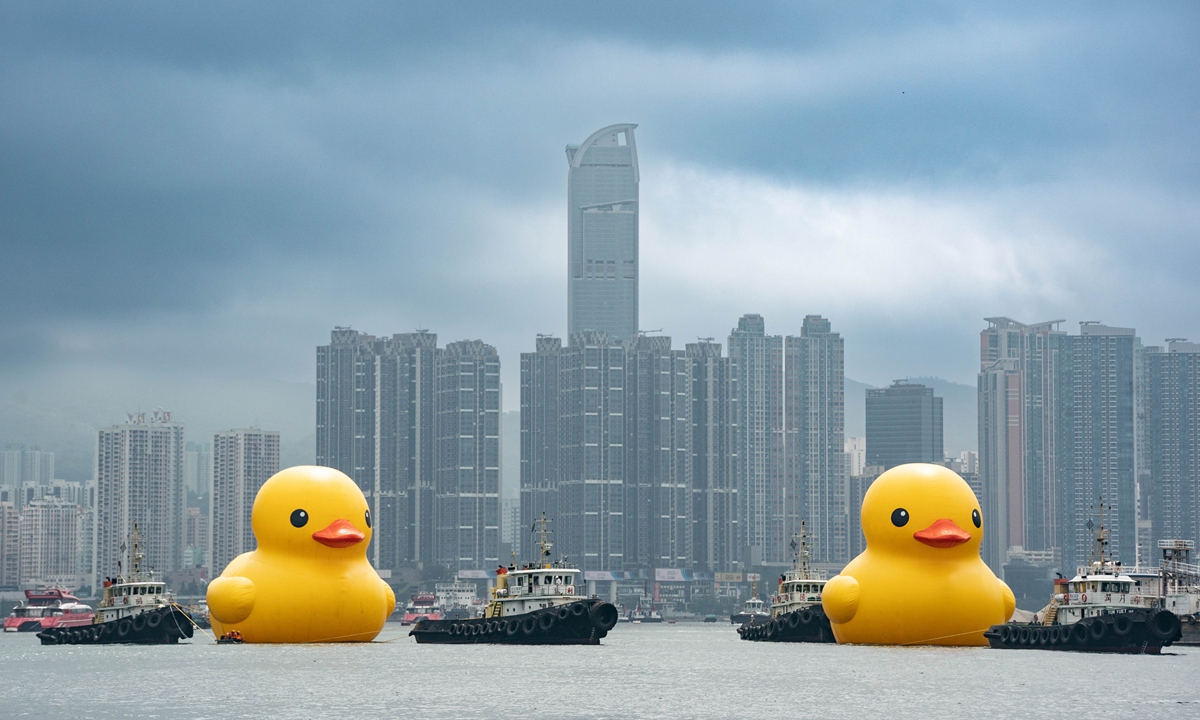
A pair of 18-meter-tall giant rubber ducks created by Dutch artist Florentijn Hofman return to Hong Kong on May 25, 2023, a decade after they first "swam" to the city in 2013, causing a sensation. Photo: VCG
The Association of Southeast Asian Nations (ASEAN) welcomes the Hong Kong Special Administrative Region (HKSAR)'s interest in participating in the Regional Comprehensive Economic Partnership (RCEP), Secretary-General of ASEAN Kao Kim Hourn said, and it's likely that the HKSAR will be able to join the RCEP in the near future, Hong Kong media outlet mingpao.com reported on Monday.
It's the right time for Hong Kong to join, and its participation will bring more vigor to the multilateral organization given the city's advantages in financial technology and green finance, experts said
Kao said during an exclusive interview with mingpao.com that the RCEP is still preparing for the establishment of units such as administrative services and drafting the rules for countries and customs territories to apply for membership. Applications for membership will be processed after these tasks, he said.
Hong Kong will be able to join, although there is no specific timetable.
HKSAR Chief Executive John Lee Ka-chiu started a visit to Singapore, Indonesia and Malaysia on July 23, seeking more cooperation opportunities with these ASEAN members while winning their support for Hong Kong's accession to the RCEP, according to a statement from the HKSAR government.
Kao said that ASEAN welcomes Hong Kong's interest in participating in the RCEP, and Hong Kong's accession will depend on the consensus of all 15 RCEP members.
Signed on November 15, 2020, the 15-member RCEP is the world's largest free trade agreement covering about 30 percent of the world's population and accounting for 30 percent of global trade. The agreement entered into force on January 1, 2022 for China and nine other countries, with the Philippines the last country to ratify the free trade agreement in June this year.
The HKSAR government has taken a positive attitude toward joining the RCEP. After the RCEP came into effect, the HKSAR government formally submitted an application to join. Secretary for Commerce and Economic Development Algernon Yau Ying-wah said on January 7 that according to the regulations, there is an 18-month waiting period, so the earliest possible accession could be in the middle of this year.
Liang Haiming, dean of Hainan University's Belt and Road Research Institute, told the Global Times on Monday that Lee's visit to Southeast Asia is a positive move for Hong Kong to join the RCEP.
Liang said that with Hong Kong's advantages and the backing of the Chinese mainland, the HKSAR government will maintain close contact and initiate discussions with member economies as soon as possible.
ASEAN is Hong Kong's second-largest trading partner, with bilateral trade reaching nearly $166 billion in 2022.
Kao described Hong Kong and ASEAN as close neighbors and hoped that bilateral trade would continue to grow. He said that Hong Kong can cooperate with ASEAN on financial technology and green finance, including providing capital for local start-ups.
According to the Census and Statistics Department, Hong Kong's second-quarter GDP rose 1.5 percent in real terms year-on-year, compared with 2.9 percent in the first quarter. The ongoing expansion was mainly attributable to sustained solid growth in private consumption and services.
Compared with the inclusiveness of the RCEP, the US said that it will not invite Hong Kong's chief executive to visit San Francisco during November's Asia-Pacific Economic Cooperation summit.
"Multilateral cooperation requires inclusiveness in order to achieve sustained development, and the US behavior shows a disregard for international rules and is a disappointment to the international community," Liang noted.




